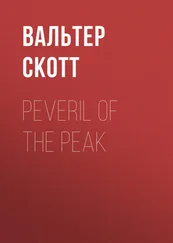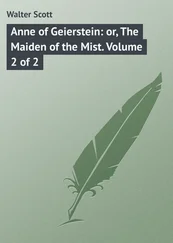Walter Scott - Peveril of the Peak
Здесь есть возможность читать онлайн «Walter Scott - Peveril of the Peak» весь текст электронной книги совершенно бесплатно (целиком полную версию без сокращений). В некоторых случаях можно слушать аудио, скачать через торрент в формате fb2 и присутствует краткое содержание. Жанр: Исторические приключения, на английском языке. Описание произведения, (предисловие) а так же отзывы посетителей доступны на портале библиотеки ЛибКат.
- Название:Peveril of the Peak
- Автор:
- Жанр:
- Год:неизвестен
- ISBN:нет данных
- Рейтинг книги:4 / 5. Голосов: 1
-
Избранное:Добавить в избранное
- Отзывы:
-
Ваша оценка:
- 80
- 1
- 2
- 3
- 4
- 5
Peveril of the Peak: краткое содержание, описание и аннотация
Предлагаем к чтению аннотацию, описание, краткое содержание или предисловие (зависит от того, что написал сам автор книги «Peveril of the Peak»). Если вы не нашли необходимую информацию о книге — напишите в комментариях, мы постараемся отыскать её.
Peveril of the Peak — читать онлайн бесплатно полную книгу (весь текст) целиком
Ниже представлен текст книги, разбитый по страницам. Система сохранения места последней прочитанной страницы, позволяет с удобством читать онлайн бесплатно книгу «Peveril of the Peak», без необходимости каждый раз заново искать на чём Вы остановились. Поставьте закладку, и сможете в любой момент перейти на страницу, на которой закончили чтение.
Интервал:
Закладка:
This the King's favourite occupation, together with his remarkable countenance, and the deportment of the rest of the company towards him, satisfied Julian Peveril that he was approaching, perhaps indecorously, near the person of Charles Stewart, the second of that unhappy name.
While he hesitated to follow his dumb guide any nearer, and felt the embarrassment of being unable to communicate to her his repugnance to further intrusion, a person in the royal retinue touched a light and lively air on the flageolet, at a signal from the King, who desired to have some tune repeated which had struck him in the theatre on the preceding evening. While the good-natured monarch marked time with his foot, and with the motion of his hand, Fenella continued to approach him, and threw into her manner the appearance of one who was attracted, as it were in spite of herself, by the sounds of the instrument.
Anxious to know how this was to end, and astonished to see the dumb girl imitate so accurately the manner of one who actually heard the musical notes, Peveril also drew near, though at somewhat greater distance.
The King looked good-humouredly at both, as if he admitted their musical enthusiasm as an excuse for their intrusion; but his eyes became riveted on Fenella, whose face and appearance, although rather singular than beautiful, had something in them wild, fantastic, and, as being so, even captivating, to an eye which had been gratified perhaps to satiety with the ordinary forms of female beauty. She did not appear to notice how closely she was observed; but, as if acting under an irresistible impulse, derived from the sounds to which she seemed to listen, she undid the bodkin round which her long tresses were winded, and flinging them suddenly over her slender person, as if using them as a natural veil, she began to dance, with infinite grace and agility, to the tune which the flageolet played.
Peveril lost almost his sense of the King's presence, when he observed with what wonderful grace and agility Fenella kept time to notes, which could only be known to her by the motions of the musician's fingers. He had heard, indeed, among other prodigies, of a person in Fenella's unhappy situation acquiring, by some unaccountable and mysterious tact, the power of acting as an instrumental musician, nay, becoming so accurate a performer as to be capable of leading a musical band; and he also heard of deaf and dumb persons dancing with sufficient accuracy, by observing the motions of their partner. But Fenella's performance seemed more wonderful than either, since the musician was guided by his written notes, and the dancer by the motions of the others; whereas Fenella had no intimation, save what she seemed to gather, with infinite accuracy, by observing the motion of the artist's fingers on his small instrument.
As for the King, who was ignorant of the particular circumstances which rendered Fenella's performance almost marvellous, he was contented, at her first commencement, to authorise what seemed to him the frolic of this singular-looking damsel, by a good-natured smile, but when he perceived the exquisite truth and justice, as well as the wonderful combination of grace and agility, with which she executed to this favourite air a dance which was perfectly new to him, Charles turned his mere acquiescence into something like enthusiastic applause. He bore time to her motions with the movement of his foot—applauded with head and with hand—and seemed, like herself, carried away by the enthusiasm of the gestic art.
After a rapid yet graceful succession of entrechats , Fenella introduced a slow movement, which terminated the dance; then dropping a profound courtesy, she continued to stand motionless before the King, her arms folded on her bosom, her head stooped, and her eyes cast down, after the manner of an Oriental slave; while through the misty veil of her shadowy locks, it might be observed, that the colour which exercise had called to her cheeks was dying fast away, and resigning them to their native dusky hue.
"By my honour," exclaimed the King, "she is like a fairy who trips it in moonlight. There must be more of air and fire than of earth in her composition. It is well poor Nelly Gwyn saw her not, or she would have died of grief and envy. Come, gentlemen, which of you contrived this pretty piece of morning pastime?"
The courtiers looked at each other, but none of them felt authorised to claim the merit of a service so agreeable.
"We must ask the quick-eyed nymph herself then," said the King; and, looking at Fenella, he added, "Tell us, my pretty one, to whom we owe the pleasure of seeing you?—I suspect the Duke of Buckingham; for this is exactly a tour de son métier ."
Fenella, on observing that the King addressed her, bowed low, and shook her head, in signal that she did not understand what he said. "Oddsfish, that is true," said the King; "she must perforce be a foreigner—her complexion and agility speak it. France or Italy has had the moulding of those elastic limbs, dark cheek, and eye of fire." He then put to her in French, and again in Italian, the question, "By whom she had been sent hither?"
At the second repetition, Fenella threw back her veiling tresses, so as to show the melancholy which sat on her brow; while she sadly shook her head, and intimated by imperfect muttering, but of the softest and most plaintive kind, her organic deficiency.
"Is it possible Nature can have made such a fault?" said Charles. "Can she have left so curious a piece as thou art without the melody of voice, whilst she has made thee so exquisitely sensible to the beauty of sound?—Stay: what means this? and what young fellow are you bringing up there? Oh, the master of the show, I suppose.—Friend," he added, addressing himself to Peveril, who, on the signal of Fenella, stepped forward almost instinctively, and kneeled down, "we thank thee for the pleasure of this morning.—My Lord Marquis, you rooked me at piquet last night; for which disloyal deed thou shalt now atone, by giving a couple of pieces to this honest youth, and five to the girl."
As the nobleman drew out his purse and came forward to perform the King's generous commission, Julian felt some embarrassment ere he was able to explain, that he had not title to be benefited by the young person's performance, and that his Majesty had mistaken his character.
"And who art thou, then, my friend?" said Charles; "but, above all, and particularly, who is this dancing nymph, whom thou standest waiting on like an attendant fawn?"
"The young person is a retainer of the Countess-Dowager of Derby, so please your Majesty," said Peveril, in a low tone of voice; "and I am——"
"Hold, hold," said the King; "this is a dance to another tune, and not fit for a place so public. Hark thee, friend; do thou and the young woman follow Empson where he will conduct thee.—Empson, carry them—hark in thy ear."
"May it please your Majesty, I ought to say," said Peveril, "that I am guiltless of any purpose of intrusion——"
"Now a plague on him who can take no hint," said the King, cutting short his apology. "Oddsfish, man, there are times when civility is the greatest impertinence in the world. Do thou follow Empson, and amuse thyself for a half-hour's space with the fairy's company, till we shall send for you."
Charles spoke this not without casting an anxious eye around, and in a tone which intimated apprehension of being overheard. Julian could only bow obedience, and follow Empson, who was the same person that played so rarely on the flageolet.
When they were out of sight of the King and his party, the musician wished to enter into conversation with his companions, and addressed himself first to Fenella with a broad compliment of, "By the mass, ye dance rarely—ne'er a slut on the boards shows such a shank! I would be content to play to you till my throat were as dry as my whistle. Come, be a little free—old Rowley will not quit the Park till nine. I will carry you to Spring-Garden, and bestow sweet-cakes and a quart of Rhenish on both of you; and we'll be cameradoes,—What the devil? no answer?—How's this, brother?—Is this neat wench of yours deaf or dumb or both? I should laugh at that, and she trip it so well to the flageolet."
Читать дальшеИнтервал:
Закладка:
Похожие книги на «Peveril of the Peak»
Представляем Вашему вниманию похожие книги на «Peveril of the Peak» списком для выбора. Мы отобрали схожую по названию и смыслу литературу в надежде предоставить читателям больше вариантов отыскать новые, интересные, ещё непрочитанные произведения.
Обсуждение, отзывы о книге «Peveril of the Peak» и просто собственные мнения читателей. Оставьте ваши комментарии, напишите, что Вы думаете о произведении, его смысле или главных героях. Укажите что конкретно понравилось, а что нет, и почему Вы так считаете.








